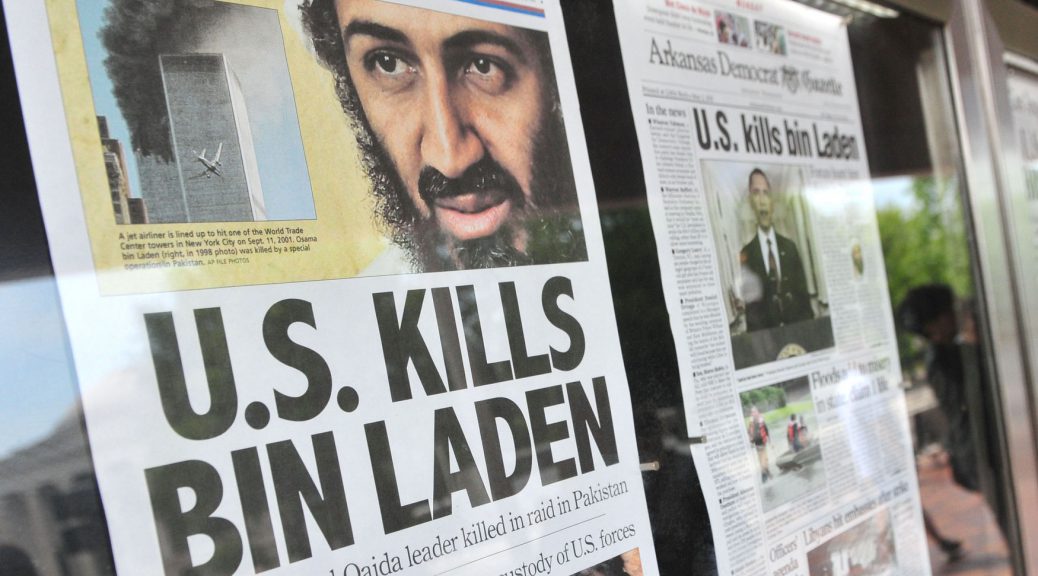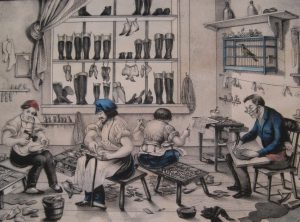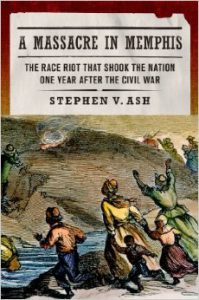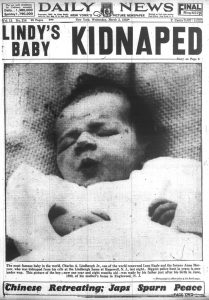May 1 Peace Love Art Activism
US Labor History
Federal Society of Journeymen Cordwainers
May 1, 1794: the Federal Society of Journeymen Cordwainers (shoemakers) was organized in Philadelphia to negotiate wages for its members, becoming the first trade union in the United States. (1806 trial)
First cigar factory
In 1810: first American cigar factory opens in Suffield, Connecticut. All the workers are women. (Suffield Historical Society article)
United Tailoresses of New York
In 1825: the United Tailoresses of New York founded. This was the first union strictly for women. (Womens Studies article) (Labor, see October 31, 1829; Feminism, see April 29,1827)
Five-day, 40-hour week
May 1, 1926: Ford Motor Company became one of the first companies in America to adopt a five-day, 40-hour week for workers in its automotive factories. (see May 20)
Federal minimum wage
May 1, 1974: the federal minimum wage rose to $2 per hour. (history of the minimum wage) (see June 3)
“A Day Without Immigrants”
May 1, 2006: rallies in cities across the U.S. for what organizers call “A Day Without Immigrants.” An estimated 100,000 immigrants and sympathizers gathered in San Jose, Calif., 200,000 in New York, 400,000 each in Chicago and Los Angeles. In all, there were demonstrations in at least 50 cities. (Guardian article) (see May 29, 2007)
Feminism
Lucy Stone and Henry Blackwell
May 1, 1855: Lucy Stone and Henry Blackwell were married by Thomas Wentworth Higginson, and issued a statement denouncing the loss of a woman’s rights upon marriage. (text via alexpeak dot com)
Matilda Josyln Gage
In 1862: Matilda Josyln Gage gave Flag Presentation Speech to 122nd regiment as they go off to the Civil War. Opposing President Lincoln, who says the war is being fought to preserve the union, Gage tells soldiers they are fighting for an end to slavery and freedom for all citizens. (Feminism, see June 25, 1863; see Gage for expanded story)
May 1 Peace Love Art Activism
BLACK HISTORY
Charleston City Railway Company
May 1, 1861: the Charleston City Railway Company adopted a resolution allowing all persons equal access to streetcars. (see Sept 22)
Confederate slave treatment
May 1, 1863: On December 24, 1862, Confederate President Jefferson Davis had issued orders to the Confederate Army “that all negro slaves captured in arms be at once delivered over to the executive authorities of the respective States to which they belong, to be dealt with according to the law of said States.” A joint resolution adopted by the Confederate Congress and signed by Mr. Davis on May 1, 1863, adjusted this policy to provide that all “negroes or mulattoes, slave or free, taken in arms should be turned over to the authorities in the state in which they were captured and that their officers would be tried by Confederate military tribunals for inciting insurrection and be subject, at the discretion of the court and the president, to the death penalty.”
The treatment of African Americans in Confederate custody varied, depending on location and the capturing commander but atrocities committed against black troops during the Civil War, such as the massacre of surrendering black troops at Fort Pillow, Tennessee, have been well documented. (see July 13 to July 16)
Memphis revolt
May 1, 1866: three days of race riots in Memphis, one of the bloodiest outbreaks of Reconstruction, left 46 black residents and two white residents dead, five black women raped and 91 homes, four churches and eight schools destroyed by fires. Fighting had already taken place between black soldiers and white Memphis policemen. The Freedman’s Bureau reported the police had been treating the African-American soldiers with brutality. False rumors spread among the white community that black citizens were planning an armed rebellion. No one was ever arrested or prosecuted for the killings. (Black Past article) (BH, see May 10; RR, see September 4, 1875)
Voting Rights
May 1, 1867: registration of black and white voters began on this day in the South. By the end of October, 1.3 million citizens had registered, including 700,000 African Americans. These black voters constituted a majority in five states: Alabama, Florida, Louisiana, Mississippi and South Carolina. (BH, see May 9; VR, June 9, 1868)
Dr. John Slawson
May 1, 1947: Dr. John Slawson, executive vice president of the American Jewish Committee presented a national program to protect civil rights to the President’s Committee on Civil Rights. The program included plans to deal with violations of the basic privileges, and also to resist group dissension, race and religious discrimination, and bigotry of all kinds. (1989 NY Times obit) (see June 29)
Integrated political rally
May 1, 1948: police arrested Glen Taylor, Progressive Party candidate for Vice President on Henry Wallace’s ticket, in Alabama for violating segregation laws by attempting to hold an integrated political rally. Taylor’s jailer is Birmingham police commissioner Bull Connor. (Today in Civil Rights History article) (see June 24, 1948)
School Desegregation denied
May 1, 1959: ordered to integrate its schools under Brown v. Board of Education, Prince Edward County, Virginia, chose instead to close all public schools on this day. They remained closed until 1964, when the Supreme Court ordered the county to open them, in Griffin v. County School Board of Prince Edward County, on May 25, 1964. While the schools were closed, the Prince Edward Foundation supported private academies to educate white students. There were no formal arrangements for African-American students; some were supported by private groups and others went to out-of-state schools. The “Lost Class of ’59” was one of the great tragedies of the struggle over school desegregation following Brown v. Board of Education. The Little Rock, Arkansas, schools were also closed for the academic year 1958–1959 because of resistance to racial integration.
The closing of the Prince Edward County schools was just one part of the program of “massive resistance” to school integration after the Supreme Court’s landmark decision in Brown v. Board of Education, on May 17, 1954. Other actions included the Southern Manifesto, signed by 100 members of Congress on March 12, 1956; an Alabama law that would have required the disclosure of the names of NAACP members, but which the Supreme Court in NAACP v. Alabama declared unconstitutional on June 30, 1958; and a set of Virginia laws designed to restrict the activities of the NAACP (September 29, 1956; April 2, 1963).
The school closing episode left a lasting legacy for education and race in the county. The 2010 Census reported that the county population was 36 percent African-American. The public school population, however, was a majority African-American, while only 5 percent of the private schools, the legacy of the closing crisis, were African-American. (BH & SD, see June 26)
To Kill a Mockingbird
May 1, 1961: Harper Lee received Pulitzer Prize in fiction for To Kill a Mockingbird. (Black History, see May 4; Harper Lee, see May 21, 2006)
Rodney King
May 1, 1992: Rodney King made an emotional plea for calm, stating, “People, I just want to say, can we all get along? Can we get along? Can we stop making it horrible for the older people and the kids?” (BH, & RR, see May 4; King, see Aug 4)
Sixteenth Street Baptist Church bombing
May 1, 2001: a jury convicted Thomas Blanton of taking part in the Ku Klux Klan’s 1963 bombing of a Birmingham, Ala., church that killed four girls, and he was given four life sentences — one for the murder of each girl. After the verdict was announced, U.S. Attorney Doug Jones announced, “Justice delayed is still justice, and we have it in Birmingham, Ala.” (BH, see June 16, see May 22, 2002)
Baltimore Police investigation
May 1, 2015: The state’s attorney of Baltimore, in an unexpected announcement, said that she had probable cause to file homicide, manslaughter and misconduct charges against the police officers in the death of Freddie Gray, who died after sustaining a spinal cord injury while in police custody.
In a news conference…the state’s attorney, Marilyn J. Mosby, said that the death of Mr. Gray had been ruled a homicide and that the police had been negligent in his death. (see June 9)
“We have probable cause to file criminal charges,” Ms. Mosby said. As she spoke outside the War Memorial here, dozens of police officers dressed in riot gear stood nearby.
Ms. Mosby described repeated mistreatment of Mr. Gray. She said that time and again police officers had mistreated him . She said they had arrested him with no grounds, violating police procedure by putting him in cuffs and leg cuffs in the van without seat belting him and then repeatedly failing to get him medical attention.
She said that when he was removed from the wagon, “Mr. Gray was no longer breathing at all.”
The death, Ms. Mosby said, is believed to be the result of a fatal injury to Mr. Gray while he was riding in the van without a seatbelt. (see June 9)
Jordan Edwards
May 1, 2017: Balch Springs Police Department (Texas) officer, Roy Oliver shot and killed 15-year-old Jordan Edwards. Edwards was a freshman at Mesquite High School and died as the result of a single rifleshot wound to the head. The teen was the youngest person to have been killed by police in the U.S. in 2017. (see May 2)
May 1 Peace Love Art Activism
DEATH PENALTY
May 1, 1932: the baby son of Charles A. Lindbergh was kidnapped from his home in Hopewell, New Jersey. The body of the infant is found in the nearby woods two months later. The incident leads Congress to pass a federal kidnapping statute, popularly known as the Lindbergh Act, that makes the crime a capital offense. Similar ‘Lindbergh laws’ are enacted in more than 20 states by the end of the decade. (see August 14, 1936)
May 1 Peace Love Art Activism
The Cold War
see Francis Gary Powers for more
May 1, 1960: the Soviets shot down a U-2 spy plane piloted by Francis Gary Powers. The 31-year-old Powers was already a veteran of several covert aerial reconnaissance missions. The CIA recruited him in 1956 to fly the Lockheed U-2, a spy plane that could reach altitudes of 80,000 feet, essentially making it invulnerable to Soviet anti-aircraft weapons. The U-2 was equipped with a state-of-the-art camera designed to snap high-resolution photos from the edge of the atmosphere.(CW, see May 12; Powers, see May 16)
May 1 Peace Love Art Activism
see May 1 Music et al for more
Teenage Culture
May 1, 1957: the first issue of 16 Magazine came out, with Elvis on the cover. (see Aug 5)
Herman’s Hermits
May 1 – 21, 1965: “Mrs Brown You’ve Got a Lovely Daughter” by Herman’s Hermits #1 on the Billboard Hot 100.
Beatles’ final scheduled live appearance in Britain
May 1, 1966: The Beatles’ final scheduled live appearance in Britain. It was their fourth appearance at the New Musical Express Annual Poll-Winners’ All-Star Concert, which took place at the Empire Pool in Wembley, London. The Beatles performed before an audience of 10,000.
The group were on a bill which also included The Spencer Davis Group, The Fortunes, Herman’s Hermits, Roy Orbison, The Overlanders, The Alan Price Set, Cliff Richard and The Shadows, The Rolling Stones, The Seekers, The Small Faces, Sounds Incorporated, Dusty Springfield, Crispian St Peters, The Walker Brothers, The Who, The Yardbirds and Dave Dee, Dozy, Beaky, Mick & Tich. The comperes were Peter Murray and Jimmy Savile.
The Beatles played a 15-minute set which included five songs: I Feel Fine, Nowhere Man, Day Tripper, If I Needed Someone and I’m Down.
Although ABC TV was filming the concert, Brian Epstein failed to reach an agreement over terms, so the cameras were turned off while The Beatles performed. The group was, however, filmed receiving their poll awards. (see May 16)
Bob Dylan
May 1, 1969: a nervous Dylan appeared on the premiere of Johnny Cash’s show recorded live in Nashville at the Ryman Auditorium. It was his first live performance since the Woody Guthrie tribute show on January 20, 1968.
That same month, Dylan and family moved to a 12-room Arts and Crafts mansion on the other side of Woodstock. It was on 39 acres. Dylan would later purchase an additional contiguous 83 acres in an attempt to insure privacy. (see July 14)
Lennon deportation
May 1, 1972: Judge Bernard J. Lasker signed a temporary order in Federal Court restraining the Immigration and Naturalization Service from holding a deportation hearing for John Lennon and Yoko Ono. Judge Lasker ruled that the Government must first hold a hearing on a motion made by the Lennons before it takes up the matter of deportation. Lennon’s motion asks that they be classified as “aliens of distinguished merit and ability.” (see Lennon for expanded chronology)
May 1 Peace Love Art Activism
Technological & Cultural Milestone
Super 8 film
May 1, 1965: after press releases in April, Eastman Kodak Co. introduced its Super 8 film format at the International Photography Exposition in New York. One of the main selling points: the plastic cartridge that made loading the film much easier. (TM, see August 20, 1967; CM, see September 8, 1966)
May 1 Peace Love Art Activism
Vietnam
George Aiken
May 1, 1969: in a speech on the floor of the Senate, George Aiken (R-Vermont), senior member of the Senate Foreign Relations Committee, urged the Nixon administration to begin an immediate “orderly withdrawal” of U.S. forces from South Vietnam. Aiken said, “It should be started without delay.” The speech was widely regarded as the end of the self-imposed moratorium on criticism that senators had been following since the Nixon administration took office. (see May 9)
College campus protests
May 1, 1970: protests erupted on campuses across the US over the Cambodian invasion including Kent State University (Ohio). (see May 3)
Helium balloons stymie helicopters
May 1, 1971: 35,000 war protesters camped out in West Potomac Park near the Washington Monument park to listen to rock music and plan for the coming action. The government planned to use low flying helicopters to disrupt the protest. This tactic was stymied by the launching of large numbers of helium filled balloons. (see May 2)
May 1 Peace Love Art Activism
Cannabis
May 1, 1971: in a televised news conference responding to question about the White House Conference on Youth, which had voted to legalize marijuana, President Nixon said: “As you know, there is a Commission that is supposed to make recommendations to me about this subject; in this instance, however, I have such strong views that I will express them. I am against legalizing marijuana. Even if the Commission does recommend that it be legalized, I will not follow that recommendation… I can see no social or moral justification whatever for legalizing marijuana. I think it would be exactly the wrong step. It would simply encourage more and more of our young people to start down the long, dismal road that leads to hard drugs and eventually self-destruction.” (next Cannabis, see June 17 or see CAC for expanded chronology)
Decline in Youth Use
May 1, 2023: a new federal study from the Centers for Disease Control and Prevention showed that high school student marijuana use had trended up from 2009-2013—before legal cannabis dispensaries started opening—but had been on the decline since then. [MM article] (next Cannabis, see May 30 or see CAC for expanded chronology)
May 1 Peace Love Art Activism
Calvin Graham
May 1, 1978: the General Counsel of the Navy informed the Secretary of the Navy that authority existed on April 5, 1943 (date of Graham’s enlistment cancellation) for the issuance of an honorable discharge. (see Graham for expanded story)
May 1 Peace Love Art Activism
Iraq War II
May 1, 2003: President George W. Bush landed in a jet on the aircraft carrier USS Abraham Lincoln off the California coast and, in a speech to the nation, declared: [M]y fellow Americans: Major combat operations in Iraq have ended. (next IWII, see May 29; last troops leave Iraq, see August 18, 2010)
May 1 Peace Love Art Activism
Stop and Frisk Policy
May 1, 2009: a new analysis of NYPD stop-and-frisk data prompted critics to raise new questions about the tactic’s effectiveness. (see May 12)
May 1 Peace Love Art Activism
TERRORISM
May 1, 2011: U.S. officials announced that al-Qaeda leader Osama bin Laden was killed in a Special Operation conducted by the CIA and United States Navy SEALs (under the direction of President Obama), in Pakistan. (see May 2)
May 1 Peace Love Art Activism
Environmental Issues
Crude oil derailment
May 1, 2014: several CSX tanker cars carrying crude oil derailed and caught fire along the James River near downtown Lynchburg, Va. (see June 23)
Trump sued
May 1, 2018: California Gov. Jerry Brown announced a lawsuit by California and 16 other states against the Trump administration to stop it from rolling back aggressive national fuel economy standards championed by the state.
Brown said actions of the Trump administration were “so outrageous,” adding “Trump is definitely running a one-man demolition derby on science, the Clean Air Act and a lot of things we are trying to do.”
Brown called Environmental Protection Agency chief Scott Pruitt “Outlaw Pruitt,” and accused him of “breaking the law.” (see July 9)
May 1 Peace Love Art Activism
LGBTQ
SEPARATION OF CHURCH AND STATE
May 1, 2017: the Supreme Court left intact California’s ban on “gay conversion” therapy aimed at turning youths under age 18 away from homosexuality, rejecting a Christian minister’s challenge to the law asserting it violates religious rights.
The justices, turning away a challenge to the 2012 law for the second time in three years, let stand a lower court’s ruling that it was constitutional and neither impinged upon free exercise of religion nor impacted the activities of clergy members.
The law prohibited state-licensed mental health counselors, including psychologists and social workers, from offering therapy to change sexual orientation in minors. The Supreme Court in 2014 refused to review the law after an appeals court rejected claims that the ban infringed on free speech rights under U.S. Constitution’s the First Amendment. (LGBTQ, see May 11; Separation, see June 26)
United Methodists
May 1, 2024: United Methodist delegates repealed their church’s longstanding ban on LGBTQ clergy with no debate, removing a rule forbidding “self-avowed practicing homosexuals” from being ordained or appointed as ministers.
Delegates voted 692-51 at their General Conference — the first such legislative gathering in five years. That overwhelming margin contrasted sharply with the decades of controversy around the issue. Past General Conferences of the United Methodist Church had steadily reinforced the ban and related penalties amid debate and protests, but many of the conservatives who had previously upheld the ban had left the denomination in recent years, and this General Conference moved in a solidly progressive direction. [AP article] (next LGBTQ, see June 11)
May 1 Peace Love Art Activism
Fair Housing
May 1, 2017: in the Bank of America Corp. v. City of Miami, the Supreme Court held 5 – 3 that the Fair Housing Act allowed the city of Miami to bring a lawsuit alleging that two banks, Bank of America and Wells Fargo. Miami, violated the law when they issued riskier but more costly mortgages to minority customers than they had offered to white borrowers.
It was not complete win for the city, as the court also ruled that the lower court should have applied a tougher test to determine whether the city can recover compensation for its losses. This meant that the case would return to the lower court for it to decide whether there was enough of a connection between the banks’ lending practices and the city’s economic injuries to hold the banks liable. (see February 23, 2018)
May 1 Peace Love Art Activism
Immigration History
May 1, 2018: Texas and six other states sued the federal government in an attempt to end the Deferred Action for Childhood Arrivals program.
The lawsuit — joined by Alabama, Arkansas, Louisiana, Nebraska, South Carolina and West Virginia — asserted that the Obama administration had overstepped its authority when it created the DACA program, which allowed individuals who were brought to the United States illegally as children to remain in the country, without congressional approval.
“The executive unilaterally conferred lawful presence and work authorization on otherwise unlawfully present aliens, and then the executive used that lawful-presence ‘dispensation’ to unilaterally confer United States citizenship,” the lawsuit says. (next IH, see May 4; next DACA, see Aug 3)
May 1 Peace Love Art Activism
Consumer Protection
May 1, 2018: federal authorities issued 13 warning letters to companies that sold vaping products like liquid nicotine in packaging that might appeal to children, including products that resembled juice boxes and candy.
The joint action by the Food and Drug Administration and the Federal Trade Commission was the latest step by the federal government to crack down on the vaping industry, particularly on devices that are popular with teenagers. (see Nov 15)
May 1 Peace Love Art Activism
Fourth Amendment
May 1, 2018: Judge Thomas A. Rappa Jr. of the New Hampshire Circuit Court ruled that the arrests of several people last summer who were charged with drug possession at an immigration checkpoint set up by the United States Border Patrol were unconstitutional under state and federal law.
Border Patrol agents working with state officials had conducted what the American Civil Liberties Union described as illegal drug searches. Sixteen residents were arrested in August at an immigration checkpoint set up on a major interstate highway about 90 miles from the Canadian border, where federal agents said they were looking for people trying to enter the country illegally.
Rappa stated that, “While the stated purpose of the checkpoints in this matter was screening for immigration violations, the primary purpose of the action was detection and seizure of drugs,” [ 14-page ruling] (see May 9)
May 1 Peace Love Art Activism
Women’s Health
May 1, 2024: the Arizona Senate voted to repeal the state’s 160-year-old near-total abortion ban, three weeks after the state Supreme Court revived the law and thrust reproductive rights into the political spotlight.
Two Republicans – Sens. Shawnna Bolick and T.J. Shope – voted with the chamber’s 14 Democrats to advance the repeal, which passed 16 to 14.
The vote comes a week after three Republicans joined with all 29 Democrats in the state House to repeal the law, which bans abortion at all stages of pregnancy except to save the life of the mother and threatens abortion providers with two to five year prison sentences. [CNN article] (next WH, see June 12)




